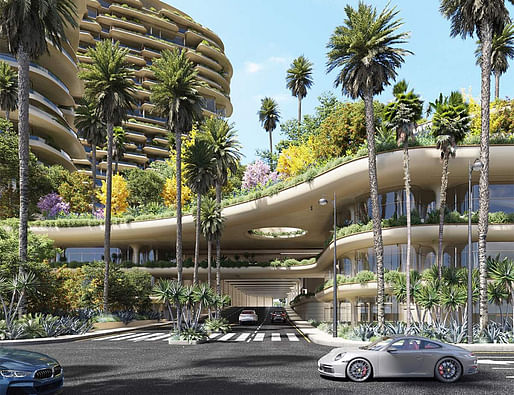

Last year, plans for One Beverly Hills, a $2 billion mixed-use, high-rise development in Los Angeles, were unveiled. The luxury project is now one step closer to realization following its approval in a 4-1 vote last week by the Beverly Hills City Council.
The development will be one of the largest in the city’s history, spanning 17.4 acres between Wilshire and Santa Monica Boulevards. The site is currently home to the Beverly Hilton and Waldorf Astoria Beverly Hills hotels. Plans for the complex include two high-rise residential buildings containing 303 units, a new hotel with 42 suites and 37 designated residences, and a four-story, approximately 35,000-square-foot pavilion containing retail and dining spaces.
The surroundings of the development would include 8.5 acres of gardens designed by local multi-disciplinary design firm RIOS, with more than half being open to the public. Two one-mile-long walkways will move through the landscape. Additionally, the project includes an underground parking garage with space for more than 2,100 vehicles.
One Beverly Hills aims to reach LEED Platinum and WELL certifications through the use of low-embodied carbon materials, moisture-sensing technology, green rooftops, electric vehicle charging stations, and high-efficiency building systems.
The master plan for the complex has been designed by Foster + Partners with Gensler acting as executive architect. The developers of the project are Oasis West Realty and BH Luxury Residences, which are owned by Israeli-American entrepreneur Beny Alagem and London-based real estate firm Cain International. Alagem, who owns the Beverly Hilton and Waldorf Astoria Beverly Hills hotels, purchased the site in 2018 along with Cain for a reported $420 million.
The single vote opposing One Beverly Hills at the June 8th meeting came from Councilman and former Beverly Hills mayor, John Mirisch, who argued that the city was granting favorable terms to business interests without sufficient benefits to residents, specifically the inclusion of affordable housing in the development.
“We are left with a project that is elitist, exclusive, and exclusionary,” said Mirisch. “Without affordable housing, the project has turned into a castle-fortress of exclusion.”
As part of a development agreement negotiated by the city and the developers, Alagem’s group will pay the city a $100 million public benefit fee over eight years, in exchange for not providing any affordable housing. Some council members have argued that this sum could be used to establish affordable housing elsewhere in the city. Beverly Hills will also receive a 5-percent municipal surcharge on luxury hotel rooms at the new Wilshire hotel, and starting in 2030, at the Beverly Hilton. It will also collect fees from sales of residential units.
To make way for One Beverly Hills, portions of the Beverly Hilton hotel will be demolished, along with a gas station. The Waldorf Astoria Beverly Hills hotel will remain intact.
“This has been a very long journey and the outcome is very exciting,” Alagem said in a statement on Monday. “We appreciate the hard work of the City Council, [Planning Commission] and staff. Their analysis and input improved One Beverly Hills. We look forward to getting started.”
The council must now approve the construction of two smaller components of the development. Once final approval is given, Alagem plans to start work on the project in the fall. Construction is slated to occur over an approximate 50-month period, possibly concluding in 2026.
No Comments
Block this user
Are you sure you want to block this user and hide all related comments throughout the site?
Archinect
This is your first comment on Archinect. Your comment will be visible once approved.